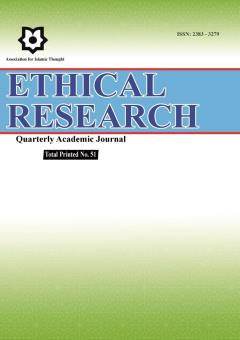An Analytical Study of the Theory of Violence in Carl Schmidt's Political Theory
Subject Areas : Ethics and Islamic Education
Samad Zahiri
1
*
,
Sattar Zanganeh Tabar
2
,
reza nasiri hamed
3
![]()
1 -
2 -
3 -
Keywords: Political, Ruler, Government, Friend-Enemy, Violence. ,
Abstract :
Violence is one of the most important aspects of the history of human political life which appears in the form of physical and mental suffering in a person. Political thinkers and theorists have tried to explain the phenomenon of violence within their political theory. Carl Schmitt is one of the most important political and legal theorists of the twentieth century who has explained the concept of violence. Schmitt divides human life into diverse and relatively independent realms of thought and action, including ethics, aesthetics, economics, etc. The realm of politics and "political" is one of these realms with the criterion of friend-enemy distinction. The political premise of the state and the state is the manifestation of the nature of politics. Politics is also the decision of the ruling person in an exceptional situation. The ruler is the one who decides in exceptional circumstances. The government, or the ruling person, has a complete monopoly on the use of violence. The ruler, who decides and assigns tasks for it from outside the legal system, is forced to use violence, which is called sovereign violence. This article attempts to explain the theory of violence in Carl Schmitt political thought.
اسپریگنز، توماس (1397)، فهم نظریههای سیاسی، ترجمه: فرهنگ رجایی، تهران، نشر آگه.
اشتراوس، لئو (1393)، «یادداشتهایی در باب کارل اشمیت، مفهوم امر سیاسی»، ترجمه: یاشار جیرانی و رسول نمازی، تهران، نشر ققنوس.
اشمیت، کارل (1392)، «مفهوم امر سیاسی»، ترجمه: سهیل صفّاری، نشر نگاه معاصر.
اشمیت، کارل (1393الف)، «مفهوم امر سیاسی»، ترجمه: یاشار جیرانی و رسول نمازی، تهران، نشر ققنوس.
اشمیت، کارل (1393ب)، «الهیّات سیاسی»، ترجمه: لیلا چمنخواه، نشر نگاه معاصر.
اِلیاس، نوربرت (1387)، «خشونت، تمدن و دولت، ترجمه: شهریار وقفیپور، در: قانون و خشونت» (گزیدۀ مقالات)، تهران، نشر رخداد نو.
اوربک، موریس (1393)، «کارل اشمیت در جستجوی امر سیاسی: الهیّات، تصمیمگرایی و مفهوم دشمن»، در: اشتراوس، لئو (1393)، مفهوم امر سیاسی، ترجمه: یاشار جیرانی و رسول نمازی، نشر ققنوس.
آگامبن، جورجو (1387)، « والتر بنیامین در برابر کارل اشمیت»، ترجمه: جواد گنجی، در: قانون و خشونت (گزیدۀ مقالات)، نشر رخداد نو.
آگامبن، جورجو (1399)، «وضعیّت استثنایی»، ترجمه: پویا ایمانی، نشر نی.
بنیامین، والتر (1387)، «نقدِ خشونت، در: قانون و خشونت»، (گزیدۀ مقالات)، تهران، نشر رخداد نو.
دادگر، یداله (1379)، «روش¬شناسی و معرفت¬شناسی اقتصاد اسلامی»، فصلنامه پژوهشی دانشگاه امام صادق، شماره یازده و دوازده، صص 61-35.
ژیژک، اسلاوی (1387)، «وجه وقیحِ حقوقِ بشر، در: قانون و خشونت» (گزیدۀ مقالات)، تهران، نشر رخداد نو.
شاکری، سیدرضا (1395)، «اهميت نظريه سياسي در نسبت با علم سياست بررسي و نقد كتاب فهم نظريه¬هاي سياسي»، پژوهشنامة انتقادي متون و برنامه¬هاي علوم انسانی، سال شانزدهم، شماره چهارم، صص 115-97.
فرایا، هلن (1391)، «خشونت در تاریخ اندیشۀ فلسفی»، ترجمه: عباس باقری، تهران، نشر فرزان.
فرهادپور، مراد (1387)، «قانون و خشونت» (گزیدۀ مقالات)، تهران، نشر رخداد نو.
لیلا، مارک (1394)، «روشنفکران و سیاست»، ترجمه: محسن قائم مقامی، تهران، نشر ماهی.
وِبِر، ماکس (1384)، «اقتصاد و جامعه»، ترجمه: عباس منوچهری و همکاران، تهران، انتشارات سمت.
هابز، توماس (1385)، «لویاتان»، ترجمه: حسین بشیریّه، تهران، نشر نی.
Bendersky w. Joseph, (1983), Carl Schmitt: Theorist for the Reich, Princeton, Available in: https://www.jstor.org/stable/26212506?seq=1
Schwab, George, the Challenge of the exception: An Introduction to the Ideas of Carl Schmitt Between 1921 and 1936, (1970), Berlin.

